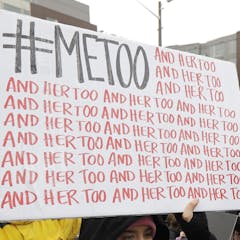
Articles on Sexual harassment
Displaying 1 - 20 of 307 articles

Australian jurisdictions are making strides to ensure consent means an active ‘yes’ rather than the absence of a ‘no’. But without better knowledge of these laws, they risk being just words on paper.

A new study examines why women who report sexual misconduct often experience retaliation while men who are alleged perpetrators of sexual assault escape repercussions.

We're joined by Michael Flood, professor at the Queensland University of Technology to discuss the harassment against women in boys only schools and what leads to some men and boys to mistreat women.

Non-disclosure agreements have been used to keep victim-survivors from speaking up. Despite guidelines addressing this, new research shows such agreements remain standard practice.

There have been disturbing reports of students making sexual moaning noises at teachers and other students. This includes students in both high school and primary school.

Studies reveal women’s research receives tougher assessment, less funding, fewer prizes and less citation than men’s.

While it can feel like little progress is being made to stop women being killed by their partners or ex-partners, the data show a steady decline in recent years.

First used in the 1970s, the social theory known as intersectionality triggered widespread debate on racial identifications and the interplay among categories.

To develop meaningful solutions, sexual harassment needs to be seen as an organizational issue and not just an interpersonal one.

This week medical leaders met in Canberra to explore why women doctors in Australia are vulnerable to sexual harassment – and to draft a set of safety standards to prevent this in future.

Online discourse about female victims of sexual harassment in Nigeria shows negative attitudes towards the victims.

In minority faith groups that already face hate, women who have experienced harassment sometimes fear bringing negative attention to their community.

While women in poverty are more likely to experience sexual harassment and domestic abuse than higher-income women, people assume it is less distressing for them.

These women most often experienced workplace sexual harassment when they were in temporary, casual or contract positions.

Our research with 124 Australian hospitality staff found women bar workers were routinely seen as ‘better suited’ to manage the threat of violence - which is both risky and exploitative.

There is increasing alarm over the lack of progress around sexual harassment and assault on Australian university campuses. Much of the focus so far has been on students but staff are also at risk.

The scourge of workplace violence necessitates a seismic shift in our perspective and response. Decisive action is required to prevent and end this crisis within the RCMP and other police forces.

New approaches are needed to address the scope of abuse young people can experience when online.

Agriculture is one of the most dangerous industries in the US, with workers exposed to vehicles, chemicals and heavy equipment. Women working on farms face another risk: sexual assault.

The RCMP’s ongoing issues with systemic misconduct and harassment and its inability to police itself require immediate, bold and systemic measures.
